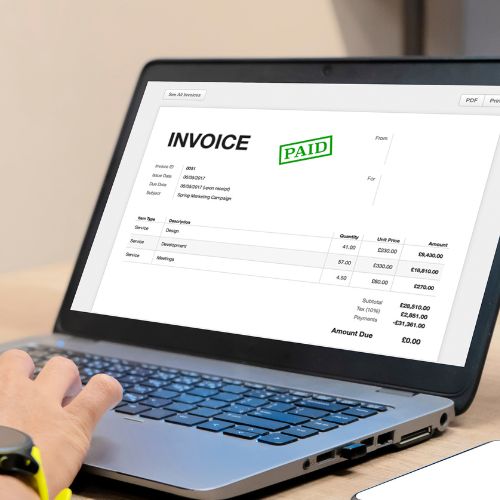Optimizing Legal Billing Cycles with SimpleLaw Software
Legal billing cycles are an essential aspect of a law firm's financial health and client relationship management. Understanding the intricacies involved in these cycles can significantly improve your firm's efficiency, cash flow, and client satisfaction. Learn more about implementing billing guidelines with SimpleLaw to streamline processes and the importance of training sessions during implementation. Further, we'll examine the significance of invoice clarity in enhancing communication with clients about their bills. Finally, learn how leveraging legal billing software to automate handling delinquencies and enhance overall efficiency within your law practice can optimize your current practices for better results.
Table of Contents:
- Pricing Models for Case Management Software
- Implementing Billing Guidelines with SimpleLaw
- Legal Invoice Clarity & Client Communication
- Automating Delinquency Handling With Legal Billing Software
- Enhancing Efficiency Through User-Friendly Legal Billing Software
- Conclusion
Pricing Models for Case Management Software
Law firm billing is a critical part of running a profitable law firm. Knowing the different pricing models for case management software is key to optimizing your legal billing cycles. The right billing policy model can save you from hidden costs and provide long-term value to your law firm.
Subscription Pricing: The Smart Choice
With a subscription pricing model, firms pay a fixed monthly or annual fee, providing predictable budgeting and access to regular updates without additional charges. This flat fee billing approach also eliminates upfront costs associated with purchasing licenses outright.
Per-User Pricing: Fair and Transparent
Per-user pricing ensures transparency by charging based on the number of users accessing the system. This means that small teams aren't overpaying, while larger firms get their money's worth from increased usage.
Per-Case Pricing: Control Your Cash Flow
Per-case pricing offers an alternative method where fees are charged according to each case managed within the system. This billing policy provides greater control over cash flow as expenses directly correlate with caseload volume.
To make an informed decision about which option suits your needs best, consider factors such as team size, projected growth rate, and typical caseloads when comparing different case management software options. Do your own due diligence - investigate and evaluate to determine which option is the best fit for you.
Implementing Billing Guidelines with SimpleLaw
Introducing new billing guidelines and a new law firm billing process can be a challenge for law firms. However, SimpleLaw, an industry leader in case management software, simplifies the process and ensures better compliance rates.
Streamlining Processes with Matter Management Software
The first step to implementing new billing guidelines and a new law firm billing process is streamlining your processes within legal billing cycles. With SimpleLaw's user-friendly interface and robust features, you can easily manage all your cases and track billable hours efficiently. The platform allows you to create customized invoices that adhere to both your firm's internal policies and client requirements.
Importance of Training Sessions in Implementation
To ensure a smooth transition towards a new law firm billing software, providing training sessions on the billing process becomes crucial. These sessions should focus on how employees can effectively use the software to improve their productivity while ensuring adherence to the newly implemented billing rules.
In addition, encouraging constructive feedback from employees during these sessions helps identify any potential issues with billing procedures, billing periods or bottlenecks early on in the implementation phase. This proactive approach facilitates continuous improvement of the system, leading to more efficient legal billing cycles over time.
Legal Invoice Clarity & Client Communication
A clear and concise legal invoice is crucial for maintaining positive client relationships. It's not just about billing for services rendered; it's also an opportunity to communicate the value you provide as a lawyer through the billing process.
To achieve clarity in invoicing, start by itemizing your services. Break down your billable hours into specific tasks, each with its own line item on the invoice. This helps clients understand exactly what they're being charged for and can reduce disputes over fees.
Another key aspect of clear communication through invoices involves using plain language instead of legal jargon. Utilizing everyday expressions, instead of legalese, when illustrating tasks such as "discovery" or "motion," is essential to make sure customers comprehend what they're being charged for and limit disagreements over fees.
Beyond clarity in individual invoices, consistent communication about billing practices overall can help manage client expectations and build trust. Regularly update your clients about any changes in pricing models or policies related to late payments, refunds, etc., preferably via email newsletters or updates on your firm's website.
Summary of Strategies for Clear Legal Invoicing:
If your law firm is attempting to create a regular billing schedule, billing system, billing period, or billing procedures, consider the following:
- Itemize Services: Break down billable hours into specific tasks for your billing system and to simplify invoice review.
- Use Plain Language: Avoid legal jargon that might confuse clients.
- Maintain Consistent Communication: Keep clients updated on any changes in billing practices or your current billable time.
- Take Different Forms of Payment: Make sure that your law firm can bill clients easily, take credit card payments from clients to pay invoices, considers flat fee billing or another alternative fee agreement, or offers payment plans for unpaid bills.
Incorporating these strategies into your invoicing process and billing workflow for legal services performed will improve transparency and customer satisfaction.
Automating Delinquency Handling With Legal Billing Software
Managing billing delinquencies can be a complex task for law firms throughout the legal industry. This process often involves time-consuming manual follow-ups and delicate conversations with clients. If your billing software does not incorporate automation within your current billing processes, consider switching to legal billing software like SimpleLaw, which has features designed to automate this process.
Many law firms struggle with late payments and unpaid final bills. The payment procedures and automation features within the SimpleLaw software customizes responses based on individual case scenarios, ensuring that each client receives personalized communication regarding their payment status. If a customer's payment is past due by thirty days or more, the automated feature can send out an email with info about what needs to be paid and potential ways of paying it quickly.
This automated approach not only saves valuable administrative time but also maintains professionalism during potentially difficult situations involving delayed payments from the clients' end. By taking advantage of these tools, law firms can streamline their collection processes while maintaining positive relationships with their clientele.
In addition to handling delinquencies efficiently, legal billing software also provides comprehensive reports on outstanding invoices and accounts receivable balances at any given point in time within legal billing cycles. These real-time insights enable lawyers to make informed decisions about managing firm finances effectively.
Benefits of Legal Billing Software for Legal Billing Cycles
There are many benefits of law firm billing software including the following:
- Automates billing delinquency handling
- Customizes responses based on individual case scenarios
- Saves valuable administrative time
- Maintains professionalism during delicate conversations with clients
- Provides comprehensive reports on outstanding invoices and accounts receivable balances
- Allows a law firm to choose hourly billing, flat fee billing, or another billing structure
- Enables lawyers to make informed decisions about managing firm finances effectively
By utilizing legal billing software, law firms can streamline their billing processes and billing system, and improve their overall financial management. Legal professionals with a regular billing schedule can translate billable time and a billing workflow into an invoice of legal services performed in order to effectively bill clients. If your current billing process does not efficiently incorporate billing tasks into timely invoice submissions where clients pay, consider visiting with the experienced law firm billing software experts at SimpleLaw.
Enhancing Efficiency Through User-Friendly Law Firm Billing Software
In the legal industry, time is money. Hence, investing in user-friendly legal billing software can significantly improve efficiency and save both time and resources. Time-tracking features that aid in accurate record-keeping eliminate manual tracking of billable hours by automatically recording all activities related to a case. Whether it's drafting documents or conducting research, every minute spent on a client's case is accurately logged without any extra effort from your end.
Besides this, user-friendly billing software also helps prevent overcharging clients through effective monitoring mechanisms. For instance, SimpleLaw's document management features allow you to track each document associated with a particular case easily. This way, you can ensure that only legitimate expenses are billed to the client while maintaining transparency at all times.
Additionally, these tools come equipped with intuitive interfaces that make them easy even for non-tech-savvy individuals to use effectively. As such, they reduce training costs and increase productivity across your firm. When used correctly, legal billing software like SimpleLaw not only simplifies complex procedures but also contributes towards enhancing overall operational efficiency within law firms - making them an indispensable asset for modern-day lawyers.
Conclusion
Law firms are businesses, and effective legal billing software increases the ability of a law firm to ensure they are paid for the legal services they provide within legal billing cycles. The law firm billing process can include invoice review, payment procedures, fee agreement structures, handling unpaid bills, creating payment plans, determining contingency fee structures, and more. All of these steps lead to one goal where clients pay invoices and the law firm grows! SimpleLaw's legal billing software works efficiently to capture time spent on case matters and provide accurate bills to clients in effective legal billing cycles. To learn more about SimpleLaw's legal billing software and legal billing process, contact our team today.


